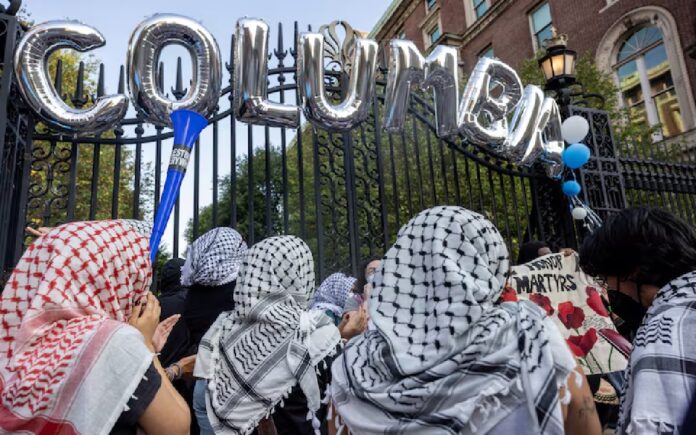New York: As the new school year approaches, Columbia University’s New York campus has already seen a resurgence of student protests. These demonstrations, which are part of a global pro-Palestinian movement that gained momentum in the spring, have once again brought the university into the spotlight.
On Sunday evening, around 50 protesters gathered outside the campus gates, creating a cacophony with whistles, drums, pots, and pans, while chanting pro-Palestinian slogans. A New York Police Department surveillance drone hovered overhead, monitoring the scene.
Inside the campus, over 1,000 new undergraduates attended a convocation ceremony where Dr. Katrina Armstrong, Columbia’s interim president, addressed the students. Despite the noise outside, Armstrong managed to convey her vision of a campus that fosters open debate and inclusivity.
Columbia administrators are working to prevent a repeat of the disruptions experienced earlier this year. In April, armed police raided the campus to arrest more than 30 students who had barricaded themselves inside an academic building. Since then, universities across the U.S. and beyond have seen similar protests and counterprotests, often involving police intervention or debates over financial ties to Israel.
“Effectively managing protests and demonstrations allows us to advance our educational and research missions while enabling free speech and debate,” Armstrong wrote in a campus-wide email last week.
Armstrong, who took over from Minouche Shafik earlier this month, is facing scrutiny following Shafik’s resignation amid criticism of her handling of the protests, including a vote of no confidence from the Arts and Sciences faculty over the decision to call in police.
The pro-Palestinian protests, led by Columbia University Apartheid Divest (CUAD), continue to demand the university end its investments in companies supporting Israel’s military occupation of Palestinian territories. Negotiations between the Columbia administration and CUAD over the summer have largely stalled, according to Mahmoud Khalil, a Palestinian graduate student and CUAD negotiator.
“The university should actually deal with the students as students, not as a threat to Columbia and the Columbia brand,” Khalil said. Columbia declined to comment on the ongoing negotiations with CUAD.
Also Read | IPC Confident in Paralympics Growth Despite Ongoing Challenges
Campus Changes
As students and faculty return to campus ahead of classes resuming on Tuesday, noticeable changes have been implemented. The south lawns, previously marked by tent encampments, have been restored to green spaces. Public safety officers now guard entrances, and new signs indicate that camping is prohibited.
Long-open campus gates are now closed under a new access control system, allowing entry only to those with Columbia IDs and pre-registered guests. Additionally, officials have set up fences and gates on wheels to cordon off areas, a measure inspected by senior NYPD officers during a recent campus tour.
Mariam Jallow, the incoming president of the Columbia College Student Council, expressed optimism about the new leadership under Armstrong. “It’s a fresh start that we really need,” said Jallow, a history major. “She doesn’t have a lot of the burdens that President Shafik had, and there are still a lot of grievances and grudges held from last year.”
Also Read | Kremlin Denies Making Deals with Telegram Founder Pavel Durov
Jallow noted that while representing a diverse student body is challenging, CUAD’s demands have garnered broad support among Columbia College students. A 2020 referendum showed 60% support for divestment from Israel, which increased to 76% in April.
The university is also continuing disciplinary proceedings against over 60 students, including Khalil, for their involvement in CUAD protests. Some students accuse the administration of dragging out these investigations to deter further protests. A Columbia spokesperson stated that the university is “working to expedite” the investigations.



